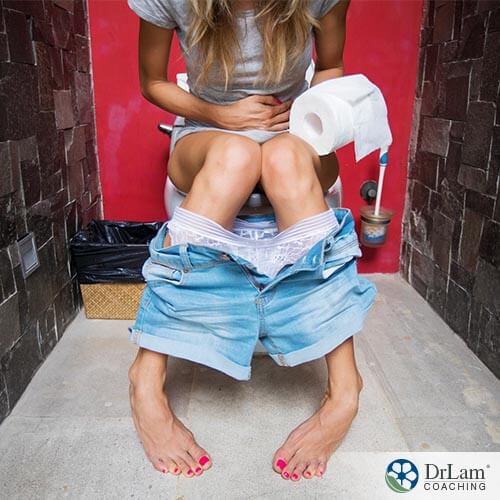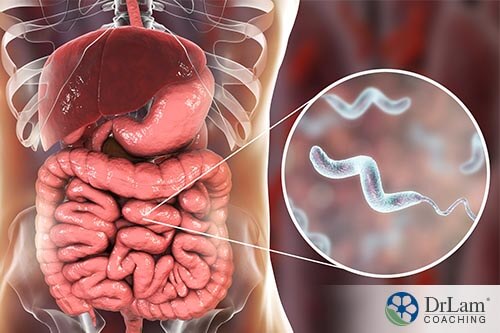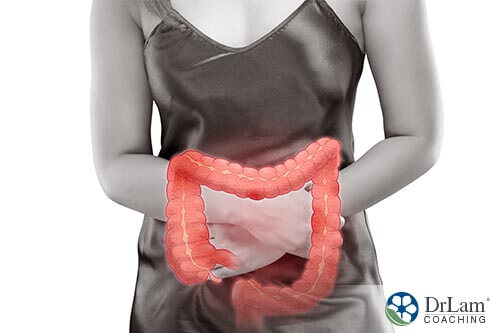It really does not matter if you are two years old or eighty-five, you probably know exactly what diarrhea is and what it feels like. A forceful and watery explosion that is prefaced by an unusual rumbling in your stomach, the sense that something is not right, and a quick run to the restroom. It is not something pleasant to experience at any time in your life.
Diarrhea may look very similar in its presentation, but the watery and loose stool are differentiated by the types:

The typical cause that most people consider when they think of diarrhea is an illness or infection. “The stomach flu” is the most common thought when people eat something that is spoiled or not cooked properly.
Norovirus and rotavirus are the plague of many parents with small children. Viruses by nature are difficult to destroy because the virus attacks the cell and takes it over like a host. You have to kill the host cell in order to eradicate the virus. Norovirus is one of those extremely contagious viruses that is well-known on cruise ships. Any surfaces that come in contact with the infected person have to be thoroughly cleaned. This would include food, cups, utensils, tables, toys, and books. Due to the risk of dehydration, those who are at risk (small children, pregnant women, elderly, and those with low-immune conditions) may be hospitalized for intravenous fluid administration.
Irritable bowel syndrome (IBS) is a common cause of diarrhea in a person. A person with IBS can swing back and forth between diarrhea and constipation, depending on their stress level. IBS is a diagnosis of exclusion only after ruling out other causes of diarrhea.
Celiac disease for centuries was not a well-known condition. It is only recently that this condition has evolved with its presence. Celiac disease is an autoimmune response to gluten. The body interprets gluten as a foreign invader and begins to attack the small intestine as it tries to digest it and causes bloating, vomiting, and diarrhea.
Intestinal parasites can cause loose stools from eating uncooked fish and meat, and from fruits and vegetables that are not cleaned properly. While modern civilizations tend to not experience intestinal parasites as much as third-world countries, it is still a possibility to acquire them. If you like to hike and drink from the local streams, then Giardia lamblia is a parasite that can infect you. It has been estimated that 80% of wild animals have this parasite in them, which means that even if the water looks clean, you have abysmal odds when drinking unpurified water.
Travelers to underdeveloped countries have to be cautious when consuming liquids in other countries. It is easy to remember to only drink bottled water, but it is more difficult to remember to use the bottled water when you brush your teeth. You should also be very careful to avoid ice unless you know precisely how the ice was created. If it was done by local tap water, then it must be avoided. Even raw vegetables that are washed in local tap water might be contaminated. Lastly, bathing and showering should also be considered. The pleasant hot water coming out of the tap should not directly hit your face because the microscopic virus particles can be inhaled or licked off your lips if you are not careful.
 The overgrowth of bacteria in your gut can be another severe cause of diarrhea. Escherichia coli (E. coli), Listeria monocytogenes, and Salmonella are significant causes of food-borne illnesses in the United States. Most readers may be able to recall a recent time that massive food recalls have occurred due to the presence of these bacteria. Freshly packaged and pre-washed lettuces are notorious for causing E. coli outbreaks. Other foods like broccoli, raw hamburger meat, milk, apricots, lunch meat (and many more!) have been recently recalled because of possible contamination.
The overgrowth of bacteria in your gut can be another severe cause of diarrhea. Escherichia coli (E. coli), Listeria monocytogenes, and Salmonella are significant causes of food-borne illnesses in the United States. Most readers may be able to recall a recent time that massive food recalls have occurred due to the presence of these bacteria. Freshly packaged and pre-washed lettuces are notorious for causing E. coli outbreaks. Other foods like broccoli, raw hamburger meat, milk, apricots, lunch meat (and many more!) have been recently recalled because of possible contamination.
Although not a parasite or illness, eating certain foods can cause very loose stools as well. Sugar alcohols like sorbitol, mannitol, and xylitol can upset the stomach and cause diarrhea. Most people do not consume a significant amount of these on a routine basis, but those who are looking for a quick diet regime may start using these at higher levels because of their minute calorie count. It is recommended that you eat these in minimal amounts.
Antibiotics, like the ones to help a sore throat, can kill the good bacteria that help the body digest food. Other antibiotics that fight against skin infections or given as a preventative measure can all negatively affect the gut.
Medications like laxatives, antacids that have magnesium in them, long-term usage of anti-inflammatory pain medicines, and chemotherapy can also be problematic. Whenever the gentle balance of good and bad bacteria is changed, the body can respond with watery stools. The digestive tract of the human body is a hardworking but delicate system that must be balanced at all times.
For a typical person, whenever the body senses a foreign invader like a bacteria or virus, or has an exhausting day, it works to deal with that invader through the NeuroEndoMetabolic (NEM) Stress Response by utilizing many different circuits. These are the hormone, bioenergetics, detoxification, inflammation, cardionomic, and neuroaffect circuits. These circuits work together to provide a healthy balance to the body.
In the first century of the Roman Empire, Celsus explained the term inflammation as the four responses that the body has to stress. They are pain, redness, heat, and swelling. The inflammation allows the blood vessels to become more open so the body can send in the defenses that it needs. The pain that is present may be from the irritation of the bacteria, or it can be from the swelling that puts pressure on the nerves. The heat and the redness present are from the increased blood flow to the area. When done correctly, the body can deal with the cause and turn everything off and return to normal. However, when dealing with chronic and long-term problems, it can be challenging to get the body back to normal. The inflammation circuit can get off-balance which can lead to increasing problems.
Some illnesses like Lyme disease and IBS can have very long-lasting effects. They are not contained in a short amount of time, and as the stress continues to work on the body, it weakens it considerably. When this happens, worsening symptoms can occur such as
 The body can localize the inflammation to one area, such as when you skin your knee, or it can go all throughout the body. For those who struggle with high blood sugar, it can be in the pancreas. In the brain, it can show up as dementia or Alzheimer’s disease. In the arteries, it can worsen heart conditions, cause hardening of the arteries, and even alter the rhythm of the heart. In the digestive tract, the inflammation causes many problems.
The body can localize the inflammation to one area, such as when you skin your knee, or it can go all throughout the body. For those who struggle with high blood sugar, it can be in the pancreas. In the brain, it can show up as dementia or Alzheimer’s disease. In the arteries, it can worsen heart conditions, cause hardening of the arteries, and even alter the rhythm of the heart. In the digestive tract, the inflammation causes many problems.
The digestive tract is a microcosm of digestive enzymes, peristaltic movements of the intestines, good bacteria, and fluid, all working correctly together to help you digest your food properly and absorb the right nutrients. Then, when done with the food, the digestive tract properly forms the leftovers and excretes them. If at any time there is a change in the NEM Stress Response’s delicate balance of the circuits, the body will show difficulty in the multiple stages of digestion. If inflammation circuit is not working properly, the stress can irritate the lining of the stomach and intestines. This can be felt as cramping, sharp or dull pain, increased gas and bloating, belching, nausea, vomiting, and diarrhea.
Whenever the body senses a lot of stress and inflammation, it attempts to bring the body back into harmony. The body’s most potent anti-inflammatory hormone is made by the adrenal glands and is called cortisol. Cortisol helps to reverse the inflammation process and cool off the hot spots to return the body back to normal. However, it can only be made if the body has the right ingredients. The best way to get the right ingredients is to eat them. If the body is inflamed in the digestive tract, it may not be able to absorb the right ingredients as it should. In addition, when you are sick, it is easier to eat comfort foods and things that taste good (such as foods that are high in carbohydrates, dairy, and white sugar) which can further disrupt the NEM stress response.
 If the body’s healthy stores are depleted, you may begin to have symptoms of Adrenal Fatigue Syndrome (AFS). AFS can start out as worsening tiredness, continual illnesses that do not go away, and anxiety. Without proper treatment, it can progress to severe exhaustion and depression-like symptoms. It is imperative to recognize the causes of inflammation and disruption of the bioenergetic and inflammation circuits within the body to prevent this from happening. In addition, it is very important to be assessed by a holistic coach who is trained in recognizing AFS because the generality of symptoms make it very difficult to understand.
If the body’s healthy stores are depleted, you may begin to have symptoms of Adrenal Fatigue Syndrome (AFS). AFS can start out as worsening tiredness, continual illnesses that do not go away, and anxiety. Without proper treatment, it can progress to severe exhaustion and depression-like symptoms. It is imperative to recognize the causes of inflammation and disruption of the bioenergetic and inflammation circuits within the body to prevent this from happening. In addition, it is very important to be assessed by a holistic coach who is trained in recognizing AFS because the generality of symptoms make it very difficult to understand.
There are many different causes of diarrhea. Some of the more common causes of diarrhea include:
